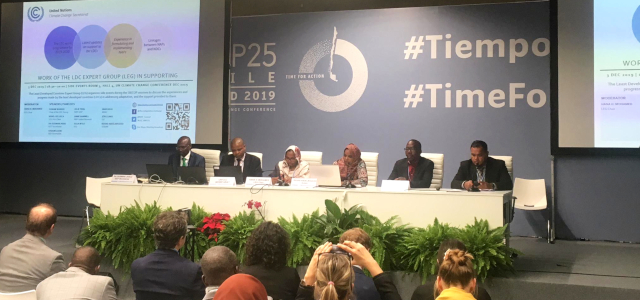Event 1: Watering the NDCs: Water-smart climate policies for improving NDC ambition and outcomes
Organisers: AGWA, GWP, IWMI, the Kingdom of the Netherlands
Key messages:
1. Water is included in the Nationally Determined Contributions (NDCs). However, indicating how to manage water in a way that will improve resilience is still missing in most NDCs.
2. To build resilience in the water sector, a bottom up approach should be followed – where one assesses the systems and policies in place, the needs of the people and the use of climate information to address water challenges.
3. One of the challenges that prevents the implementation of NDCs, is that line ministries don't fully understand NDCs and National Adaptation Plans (NAPs). They usually depend on the environmental ministry to incorporate climate action commitments in the NDCs and NAPs; therefore, it becomes highly unlikely that action (as indicated in NAPs and NDCs) will be taken by the line ministries.
Event 2: What if we miss the target? Climate change and socioeconomic risks at global warming of 1.5°C - 4°C
Organiser: University of Exeter
Speakers: Prof Richard Betts, Met. Office Hadley Centre and University of Exeter Representative from INPE, Instituto Nacional de Pesquisas Espaciais Dr Grady Walker, Walker Institute, University of Reading Representative from CATHALAC, Water Centre for the Humid Tropics of Latin America and the Caribbean, EcoTrust
Key messages:
1. It is important to invest in building a decentralized data collection system, by collecting information from different factors such as rainfall, groundwater and household livelihoods. This information will play a critical role in developing strategies to address hazards and respond locally, thereby strengthening resilience at community level. The information should be accessible locally to support decision-making processes at community level.
2. Climate information is not easily accessible to vulnerable populations. The University of Reading representative advised that climate science information should be communicated in various languages and social media can also be used as a communication tool, for climate science to reach more people. The same representative also recommended that capacity should be built in vulnerable populations, so that they will be able to interpret climate science information and use it to make decisions.
3. EcoTrust stated that the vulnerable populations, such as farmers, usually have innovative adaptation measures.Therefore, funders must look into investing in traditional adaptation initiatives to assist communities to build their adaptive capacity.
During the question and answer session, the Green Climate Fund (GCF) advised that countries have a choice to make their country programmes to be multi-sector specific or to focus on one sector such as water for the 5 year replenishment period. Readiness proposals can also focus on building capacity in one sector. However, once the country programme is submitted to the GCF it becomes difficult to add more priority intervention areas.
Event 3: Work of the LEG in supporting the LDCs on adaptation
Organiser: UNFCCC
Speakers: LEG Chair and members; LDC Parties; GCF and GEF and their related entities and agencies
Key messages:
1. Methodologies and tools for characterizing the climate system are being made available through WMO with GCF funding – an online platform to access data and information will be launched soon through collaboration with the Swedish Meteorological and Hydrological Institute (SMHI).
2. The NAP process offers entry points for private sector engagement. A detailed analysis detailing these entry points is available here.
3. Integrating agriculture in National Adaptation Plans (NAP-Ag) highlighted the need to include work at the sub-national level and focus on gender
Gender responsive NAPs have longer lasting impacts. More details on how to approach this is available here.
Photo: The panel of the LEG event

